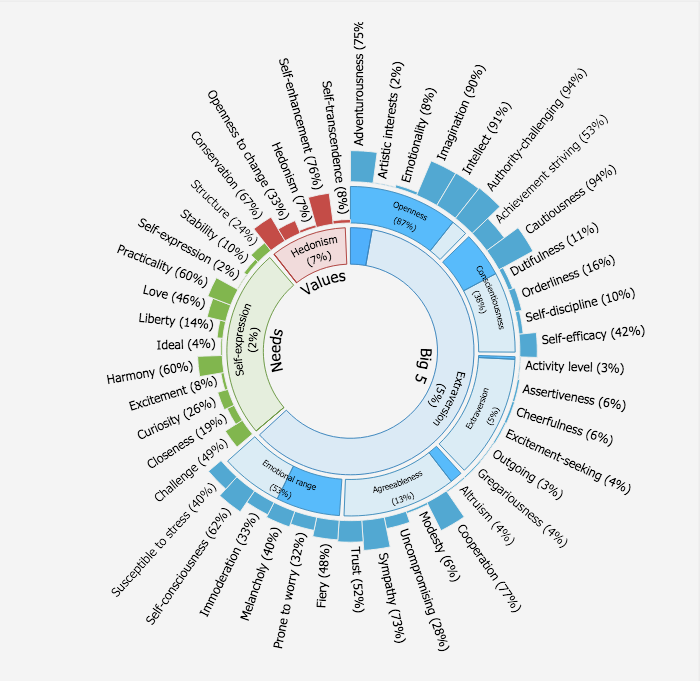Free Social Media Personality Test
Free Social Media Personality Assessment Test
What is your Social Media Personality Type?
Are you introverted or extraverted? What kind of information do you tend to share on social media? Do you censor your post before you get it published? Find out your Social Media Personality Traits by analyzing your social media posts on Twitter, Tumblr, Facebook, and Typology Central Forum.
Take the Social Media Personality Assessment Test
The test uses three models to evaluate what you have written:
- The Big 5 - The Big Five is a taxonomy of personality traits. Each of the five dimensions (or factors) is made up of a number of facets that provide a more in depth understanding of each of the five personality dimensions.
- Needs – Needs are motivating forces that compel you to action to fulfill an underlying desire.
- Values - Values describes motivating factors that influence a person’s decision-making.
The Big 5 Personality Model
The Big 5 Personality Model defines a set of five key personality traits: openness, conscientiousness, extraversion, agreeableness, and neuroticism. It was developed by researchers who studied known personality traits and then performed factor analysis of hundreds of measures of these traits to find underlying factors of personality.
The Big 5 and their underlying facets
Extraversion - This factor describes the degree to which an individual is introverted or extraverted. Individuals who score higher on extraversion are energized by being around people and in groups. Individuals who are more introverted gain energy and become rejuvenated by alone time. They tend to be quieter, more low key and more deliberate.
Agreeableness - Highly agreeable people tend towards being friendly, helpful, considerate, trusting and make sacrifices for others. Low scoring people tend towards skepticism, suspicousness and place impersonal objectives above getting along. This factor Includes traits like sympathetic, kind, and affectionate.
Conscientiousness - High scores on conscientiousness include a strong ability to regulate and control ones behavior. Individuals possessing this trait tend towards an achievement orientation and being organized, thorough and planful. Individuals with lower scores tend towards being more impulsive and less organized.
Neuroticism - Neuroticism refers to the level of Emotional Stability an individual has. Highly neurotic people are more prone to negative emotions such as anger, anxiety or depression. They are more easily stressed out and tend towards being more reactive. Low scorers tend towards being more calm and collected.
Openness - This factor describes how open or closed your thinking is. Highly open people are intellectually curious, appreciate the arts, emotion, imagination and new experiences. People who are less open tend towards tradition, familiarity and do not like as much change in their lives.
